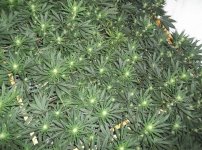ISM2
Member
Soil: (60%) Miracle-Gro Nature’s Care Organic Garden Soil, (40%) Miracle-Gro Perlite
Flowering nutrients: Miracle Gro Bloom Booster - 15-30-15
I use 1/8tsp per gallon of water and use this every time I water up until harvest.
I've had good results doing it this way but wanted to discuss pros/cons, and if maybe I should increase the amount over time as the plants get further into flowering.
Flowering nutrients: Miracle Gro Bloom Booster - 15-30-15
I use 1/8tsp per gallon of water and use this every time I water up until harvest.
I've had good results doing it this way but wanted to discuss pros/cons, and if maybe I should increase the amount over time as the plants get further into flowering.






